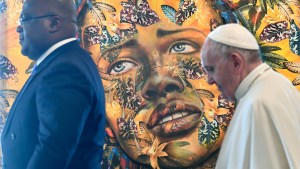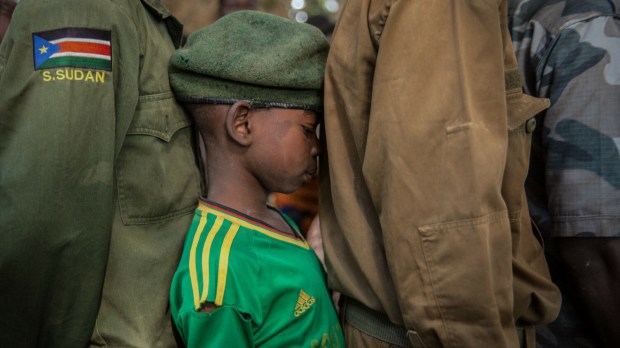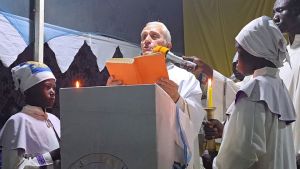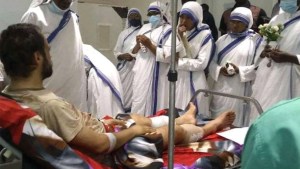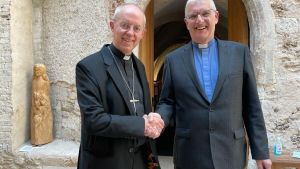After spending three days in the Democratic Republic of Congo, Pope Francis is traveling to South Sudan, a country founded in 2011 and which has since known nothing but war. It’s a trip with a new format: Francis will be accompanied by the Archbishop of Canterbury, who is the head of the Anglican Church, and by the Moderator of the General Assembly of the Church of Scotland.
The image went around the world: Pope Francis on his knees, going so far as to kiss the feet of the two Christian political opponents – Salva Kiir, Catholic, and Riek Machar, Protestant – to beg them to make peace. In April 2019, the Vatican had opened its doors to offer a spiritual retreat to South Sudan’s president and vice president. It was a truce in an internal struggle between two ethnic groups – Dinka and Nuer – that has plunged the world’s youngest country into a bloody war that has left 400,000 dead and thousands displaced. These figures are in addition to the 2 million deaths caused by the two successive wars of independence that took place there in the second half of the 20th century.
“It’s estimated that refugees in neighboring countries and internally displaced persons represent about 4 million South Sudanese out of a total of 12 million, i.e. a third of the South Sudanese population,” says Paolo Impagliazzo, secretary general of Sant’Egidio, a Catholic movement that is very involved in conflict resolution and is playing the role of mediator in the South Sudanese crisis.
The scale of the disaster in this Christian country has prompted church leaders to innovate and set up ecumenical diplomacy. In this English-speaking East African country, the Pope is not coming alone but will walk alongside Archbishop of Canterbury Justin Welby and Moderator of the General Assembly of the Church of Scotland Iain Greenshields.
Just a few hours before their arrival, there were more deaths:
Answering Jesus’ prayer
“This will be a historic visit. After centuries of division, leaders of three different parts of the Church are coming together in an unprecedented way, and in so doing are seeking to be part of answering another prayer – Jesus’ prayer – that his followers might be one,” the Anglican Church leader said before the trip. “We come as servants – to listen to and amplify the cries of the South Sudanese people, who have suffered so much and continue to suffer because of conflict, devastating flooding, widespread famine and much more,” Justin Welby further explained.
In what the Pope called an “ecumenical pilgrimage of peace,” Christian leaders will meet again with the country’s authorities, less than four years after the famous Vatican retreat.
With militias still clashing in the country despite the formation of a “national unity and transition” government in February 2020, the closed-door exchanges could be frank and direct.
“I think the pope is very forceful in private with these personalities,” says a senior Curia official who admits, however, that he doesn’t expect concrete results from this visit, which takes place in an unfavorable context; the government of South Sudan recently announced that it was suspending its participation in the Rome peace talks in which the Sant’ Egidio community is involved. “The key is for those in power to begin to take into consideration the situation of the population,” he says.
The three Christian church leaders will also meet with the victims of these conflicts. On Saturday, they’ll hear from children growing up in camps for the displaced, places that are not spared from the violence. Together, they will also participate in a time of ecumenical prayer at the “John Garang” Mausoleum, where the founding father of South Sudan’s independence lies.
Encouraging a young church
In a country wracked by ethnic conflict, the church is also riven by tensions. Very often, ethnicity takes precedence over religious belonging and violence even insinuates itself even within the South Sudanese clergy, composed of 300 priests and 10 bishops.
Just before he was installed as Bishop of Rumbek, missionary priest Christian Carlassare, originally from Italy, was the target of a Kalashnikov attack in April 2021 as part of a score-settling exercise linked to internal conflicts among the local clergy. Among the accused was a priest who was sentenced to seven years in prison. As for the young bishop, who had been on mission in South Sudan for 18 years, he was only able to regain the use of his legs after long treatment in Kenya and then in Italy.
In this context, Pope Francis will undoubtedly renew his call to put an end to tribalism, as he did during his trip to Kenya in 2015. “In the stadium, I spoke about tribalism and everyone stood up, they said ‘no to tribalism,’” he recalled in an interview published last week by the AP agency. In that same interview he again lamented the fact that in the appointment of African bishops, it is necessary to ensure the “group membership” of the candidate.
